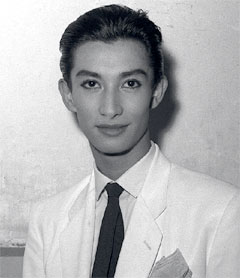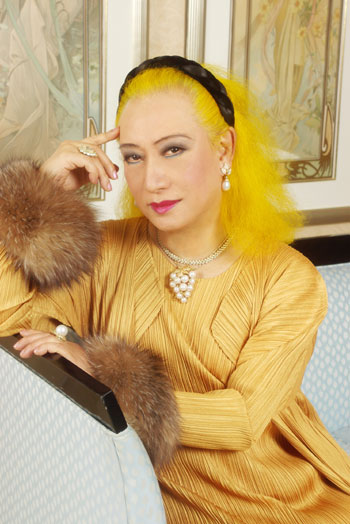| english | 日本語 |
|
terre thaemlitz writings 執筆 |
|
Mrs. Style Icon Terre Thaemlitz on Akihiro Miwa - Terre Thaemlitz |
Originally published in Electronic Beats (DE), Issue 29, Spring 2012. This article was digested from conversation by EB editor Alexander James Samuels.

Famed actress and singer Akihiro Miwa grew up in Nagasaki, where as a child she survived the city's nuclear attack to go on to become one of Japan's most celebrated transgender personalities. Here, activist, computer musician and Comatonse label owner Terre Thaemlitz pays respect to Miwa's critical voice and uncompromising self image.
Photo: Tokyo, 1955. A portrait of the artist as a young dandy. ©Kyodo News.
I don't know if I'd go so far as to call Akihiro Miwa my personal "icon", if only because I’m not into all the social power behind the making of icons. And I actually really hate fashion, because it’s so rooted in gender and class divisions. But Miwa can’t be reduced to a fashion icon in the conventional sense anyways. She started out singing French chansons and doing cabaret in Tokyo's Ginza district in the sixties, and today you couldn’t find a single person in Japan who doesn't know who she is. It’s pretty remarkable considering how left-leaning and openly critical she's been of the Japanese government and political status quo in her stage shows and on TV over the years. On stage, she always goes into monologues about social issues between songs. Being a survivor of the atomic blast at Nagasaki, she’s always been quite outspoken―not only against the broader theme of war, but also against the government policies that led to the war and the unjust treatment and care of survivors.
For better or worse, I think a lot of her initial pop success had to do with just how femininely beautiful she was in her youth. She also had some edge, which was clear from her first hit in the late fifties, "Meke-Meke". That song used a lot of "dirty words" that had never been spoken on record, and this was thirty years before hip-hop started doing the same. I first became aware of her in the late eighties after seeing an underground New York screening of her 1968 film, Kuro Tokage ("Black Lizard"). The film is based on a play by Yukio Mishima, a famous gay author who committed suicide while still quite young. Mishima has a little cameo in the film, and there’s a really nice "outing" scene where Miwa kisses him, then turns right to the camera and says, "So now you know…" It really made an impression on me because even up into the eighties, that was something you just didn’t see in Hollywood cinema.
Unlike many countries, the non-transitioning transgender scene in Japan is pretty visible―especially in terms of media presence. And that’s rare, because in so many other places the media only focuses on the immaculate, perfectly passing, post-op, male-to-female ideal. That’s exactly what Miwa isn’t, and she shows that being transgender doesn’t always have to be equated with hormones and operations. A small part of the Japanese acceptance of these ideas is cultural, since Japanese people are traditionally not that into body alteration. With all of Japan’s social emphasis on fashion, many women still don’t have pierced ears. But it’s not about being conservative; it’s just not how most people approach their bodies here. Personally, I knew from a pretty early age that even if I wanted to medically transition, it just wasn’t financially possible. Class and economics are at the heart of the concept of passing, which is ironic given the poverty most transgendered people live in around the world. Miwa, for me, stands for the potential for transgendered people accepting their own body and growing old with it. And resisting becoming simply "male" or "female." This is a bit unconventional . . . and for me, very, very important.
 Musically, I can't identify with what Miwa does, because I actually hate chansons and French pop music in general. As a non-performative computer musician, one of my main goals is to offer an alternative vision of the transgendered stage. Glam is just not my cup of tea. Also, as she’s gotten older, Miwa's taken a sharp spiritual turn and started talking a lot about the importance of colors and auras, which is why she now dyes her hair bright yellow. Talk of auras is standard in a lot of eastern religions - but it's ultimately a swindle. She actually hosted a weekly television show about it. I mean, I despise religion and spirituality, so that was a pretty upsetting change for me. For several of my friends, too. We all admired her for her focus on social issues over the decades, because aside from the fact that it was always unwavering, it was also grounded in political realities people can change. And I think it’s sad when older people suddenly preach faith as they start worrying about death. But unwelcome spiritual themes are always lurking about in transgendered communities, if only because the dominant discourses on the subject revolve around a perceived split between the physical body and the "inner self." It’s a metaphor that lends itself all to easily to metaphysics. So her changes are a bit disappointing, but not surprising. I’m thankful she's still here, showing the world that being transgendered is not only about youthful beauty.
Musically, I can't identify with what Miwa does, because I actually hate chansons and French pop music in general. As a non-performative computer musician, one of my main goals is to offer an alternative vision of the transgendered stage. Glam is just not my cup of tea. Also, as she’s gotten older, Miwa's taken a sharp spiritual turn and started talking a lot about the importance of colors and auras, which is why she now dyes her hair bright yellow. Talk of auras is standard in a lot of eastern religions - but it's ultimately a swindle. She actually hosted a weekly television show about it. I mean, I despise religion and spirituality, so that was a pretty upsetting change for me. For several of my friends, too. We all admired her for her focus on social issues over the decades, because aside from the fact that it was always unwavering, it was also grounded in political realities people can change. And I think it’s sad when older people suddenly preach faith as they start worrying about death. But unwelcome spiritual themes are always lurking about in transgendered communities, if only because the dominant discourses on the subject revolve around a perceived split between the physical body and the "inner self." It’s a metaphor that lends itself all to easily to metaphysics. So her changes are a bit disappointing, but not surprising. I’m thankful she's still here, showing the world that being transgendered is not only about youthful beauty.